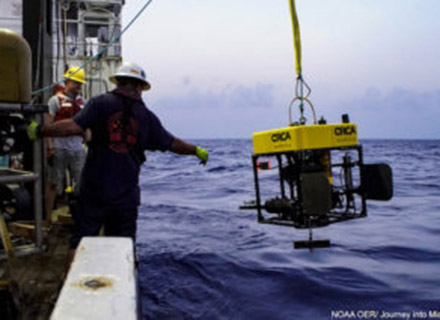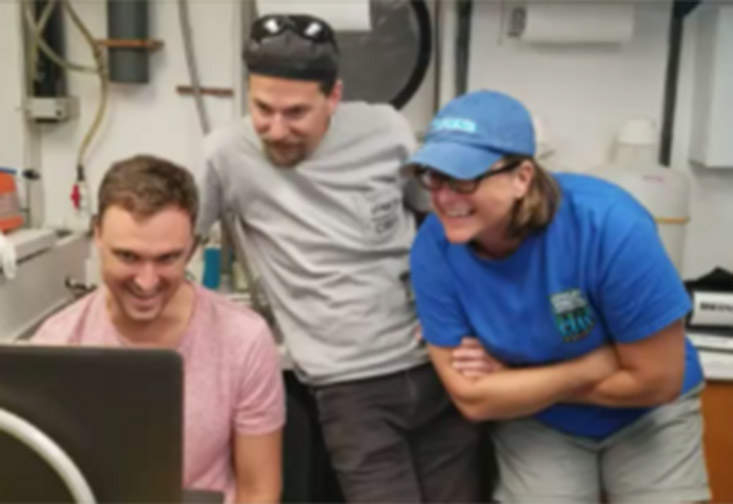Sleep comes at a premium on a research cruise – you take it when you can get it – but some things are worth waking up for.
When USF St. Petersburg Marine Biology Professor Heather Judkins was awoken last week aboard the Research Vessel Point Sur to news that her colleagues had possibly caught a giant squid on camera, Judkins was up faster than you can say the scientific name Architeuthis.
Judkins joined a handful of her colleagues huddled over a screen, replaying a 25-second clip of a squid attacking the Medusa, a submersible camera system designed to lure deep-sea creatures with a ring of pulsating lights. Judkins, a cephalopod expert and president of the Cephalopod International Advisory Council, was pretty sure she knew what she was watching.
“The arms looked right,” she said. “There were large suckers on the tentacle clubs. We couldn’t see the fin, which would have sealed the deal, but I was about 75 percent sure it was a giant squid.”
The science team reached out to Dr. Michael Vecchione, a cephalopod expert with NOAA at the Smithsonian National Museum of Natural History, for confirmation. Vecchione agreed: “I think that’s an Architeuthis.”
The discovery made news waves around the world, including being featured in The New York Times, which broke the story Friday, and The Washington Post. The footage is only the third time a live giant squid has ever been filmed, and the second time one has been filmed in its deep, dark habitat more than 750 meters below the surface. This is the first giant squid filmed in U.S. waters.
The footage was made possible by an innovative camera system that uses LED lights to mimic bioluminescent jellyfish. Developed by Dr. Edie Widder, founder of the Ocean Research and Conservation Association, the Medusa camera captured the first giant squid footage off the coast of Japan in 2012.
Now that the system has been successful twice in the field, Judkins said, “We know the Medusa, this electronic jellyfish, really works.”
Judkins admitted she was at first skeptical that they would film a giant squid on the two-and-a-half-week expedition. She knew giant squid live in the Gulf of Mexico because she’s collected and documented dead specimens.
“But there’s a lot of water out there and we weren’t scouring the entire Gulf of Mexico,” she said. “We weren’t sure that we were going to find a giant squid.”
The footage serves as motivation for further research and exploration.
“We’ve only looked at about 5 percent of the world’s oceans,” Judkins said. “We’ve barely studied from the 1000-meter mark to the sea floor.”
One of Judkins’s biggest takeaways is that these creatures are in our proverbial back yard. The giant squid was filmed just 100 miles south of Louisiana, within sight of a floating oil-drilling platform in the Gulf of Mexico. That proximity raises questions about how human-caused environmental change will impact deep-sea life.

“How are giant squid going to react to our anthropogenic inputs?” Judkins asked. “How are they going to handle things like climate change and ocean acidification?”
Filming a giant squid in the Gulf is really just the beginning of this discovery.
“There are a billion questions still out there about the giant squid,” she said. “Now that we’ve seen them alive and in their Gulf habitat, we can start to get a better sense of their behavior, including how they interact with our equipment and other organisms.”
The expedition, Journey Into Midnight: Light and Life Below the Twilight Zone, was funded by the NOAA’s Office of Ocean Exploration.
